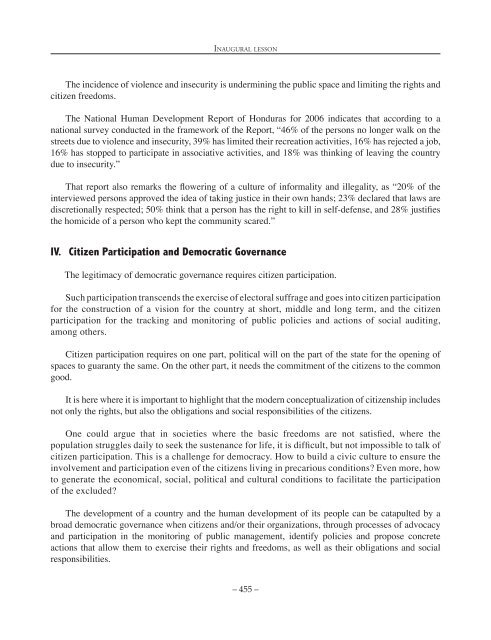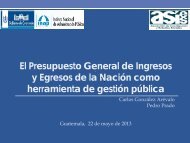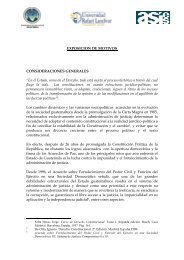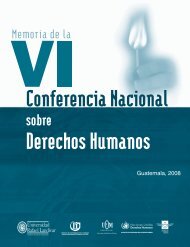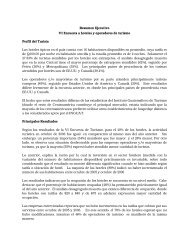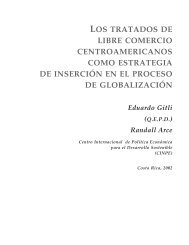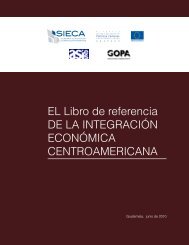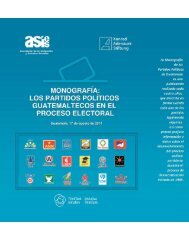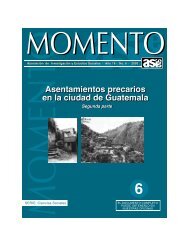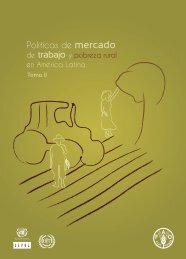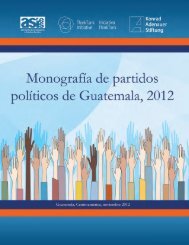- Page 1 and 2:
Instituto de Derechos HumanosUniver
- Page 3:
323.119M533Memoria de la V Conferen
- Page 6 and 7:
TALLERES PREPARATORIOSPRIMER TALLER
- Page 8 and 9:
PRIMERA SESIÓN PLENARIATEMA“LOS
- Page 10 and 11:
Representante del sector privadoLic
- Page 12 and 13:
INDEXPRESENTATION / 419M.A. María
- Page 14:
PRESENTACIÓN YLECCIÓN INAUGURAL
- Page 17 and 18:
PRESENTACIÓN Y LECCIÓN INAUGURALP
- Page 19 and 20:
MEMORIA DE LA V CONFERENCIA NACIONA
- Page 21 and 22:
MEMORIA DE LA V CONFERENCIA NACIONA
- Page 23 and 24:
MEMORIA DE LA V CONFERENCIA NACIONA
- Page 25 and 26:
MEMORIA DE LA V CONFERENCIA NACIONA
- Page 29 and 30:
MEMORIA DE LA V CONFERENCIA NACIONA
- Page 32 and 33:
LECCIÓN INAUGURALPero volviendo al
- Page 34 and 35:
LECCIÓN INAUGURALM.A. ANDERS KOMPA
- Page 36 and 37:
PONENCIALICDA. MARICLAIRE ACOSTA UR
- Page 38 and 39:
LECCIÓN INAUGURALc. Todos estos in
- Page 40:
LECCIÓN INAUGURALEn otras palabras
- Page 43 and 44:
MEMORIA DE LA V CONFERENCIA NACIONA
- Page 45 and 46:
MEMORIA DE LA V CONFERENCIA NACIONA
- Page 47 and 48:
MEMORIA DE LA V CONFERENCIA NACIONA
- Page 49 and 50:
MEMORIA DE LA V CONFERENCIA NACIONA
- Page 51 and 52:
MEMORIA DE LA V CONFERENCIA NACIONA
- Page 53 and 54:
MEMORIA DE LA V CONFERENCIA NACIONA
- Page 55 and 56:
MEMORIA DE LA V CONFERENCIA NACIONA
- Page 57 and 58:
MEMORIA DE LA V CONFERENCIA NACIONA
- Page 59 and 60:
MEMORIA DE LA V CONFERENCIA NACIONA
- Page 62 and 63:
1ER. TALLER PREPARATORIOLOS DERECHO
- Page 64 and 65:
TALLERES PREPARATORIOSREPRESENTANTE
- Page 66:
TALLERES PREPARATORIOSII. Objetivo
- Page 69 and 70:
MEMORIA DE LA V CONFERENCIA NACIONA
- Page 71 and 72:
MEMORIA DE LA V CONFERENCIA NACIONA
- Page 73 and 74:
MEMORIA DE LA V CONFERENCIA NACIONA
- Page 76 and 77:
TALLERES PREPARATORIOSEXPOSITORA DE
- Page 78 and 79:
TALLERES PREPARATORIOSEl abordaje d
- Page 80 and 81:
TALLERES PREPARATORIOSPero echemos
- Page 82 and 83:
TALLERES PREPARATORIOSEl acceso a l
- Page 84:
TALLERES PREPARATORIOSAnexoLos Obje
- Page 87 and 88:
MEMORIA DE LA V CONFERENCIA NACIONA
- Page 89 and 90:
MEMORIA DE LA V CONFERENCIA NACIONA
- Page 91 and 92:
MEMORIA DE LA V CONFERENCIA NACIONA
- Page 93 and 94:
MEMORIA DE LA V CONFERENCIA NACIONA
- Page 95 and 96:
MEMORIA DE LA V CONFERENCIA NACIONA
- Page 97 and 98:
MEMORIA DE LA V CONFERENCIA NACIONA
- Page 99 and 100:
MEMORIA DE LA V CONFERENCIA NACIONA
- Page 101 and 102:
MEMORIA DE LA V CONFERENCIA NACIONA
- Page 103 and 104:
MEMORIA DE LA V CONFERENCIA NACIONA
- Page 105 and 106:
LOS DERECHOS HUMANOS ANTE LOS CUERP
- Page 107 and 108:
MEMORIA DE LA V CONFERENCIA NACIONA
- Page 109 and 110:
MEMORIA DE LA V CONFERENCIA NACIONA
- Page 111 and 112:
MEMORIA DE LA V CONFERENCIA NACIONA
- Page 113 and 114:
MEMORIA DE LA V CONFERENCIA NACIONA
- Page 115 and 116:
MEMORIA DE LA V CONFERENCIA NACIONA
- Page 117 and 118:
MEMORIA DE LA V CONFERENCIA NACIONA
- Page 119 and 120:
MEMORIA DE LA V CONFERENCIA NACIONA
- Page 121 and 122:
MEMORIA DE LA V CONFERENCIA NACIONA
- Page 123 and 124:
MEMORIA DE LA V CONFERENCIA NACIONA
- Page 125 and 126:
MEMORIA DE LA V CONFERENCIA NACIONA
- Page 127 and 128:
MEMORIA DE LA V CONFERENCIA NACIONA
- Page 129 and 130:
MEMORIA DE LA V CONFERENCIA NACIONA
- Page 132 and 133:
TALLERES PREPARATORIOSREPRESENTANTE
- Page 134 and 135:
TALLERES PREPARATORIOSIndicios de l
- Page 136:
TALLERES PREPARATORIOSciedad, los c
- Page 139 and 140:
EL FENÓMENO DE LA MIGRACIÓN Y SUR
- Page 141 and 142:
MEMORIA DE LA V CONFERENCIA NACIONA
- Page 144 and 145:
TALLERES PREPARATORIOSREPRESENTANTE
- Page 146 and 147:
TALLERES PREPARATORIOSOtra consecue
- Page 148 and 149:
TALLERES PREPARATORIOSEs necesario
- Page 150 and 151:
TALLERES PREPARATORIOSREPRESENTANTE
- Page 152 and 153:
TALLERES PREPARATORIOSEl caso más
- Page 154 and 155:
TALLERES PREPARATORIOSLa legislaci
- Page 156 and 157:
TALLERES PREPARATORIOSREPRESENTANTE
- Page 158 and 159:
TALLERES PREPARATORIOS“El trabajo
- Page 160 and 161:
TALLERES PREPARATORIOSc. Estímulo
- Page 162:
TALLERES PREPARATORIOSConclusiónSe
- Page 165 and 166:
MEMORIA DE LA V CONFERENCIA NACIONA
- Page 167 and 168:
MEMORIA DE LA V CONFERENCIA NACIONA
- Page 169 and 170:
MEMORIA DE LA V CONFERENCIA NACIONA
- Page 171 and 172:
MEMORIA DE LA V CONFERENCIA NACIONA
- Page 174:
SESIONES PLENARIASCIUDAD DE GUATEMA
- Page 177 and 178:
LOS DERECHOS ECONÓMICOS, SOCIALES
- Page 179 and 180:
MEMORIA DE LA V CONFERENCIA NACIONA
- Page 181 and 182:
MEMORIA DE LA V CONFERENCIA NACIONA
- Page 184 and 185:
SESIONES PLENARIASREPRESENTANTE DEL
- Page 186 and 187:
SESIONES PLENARIASPodríamos decir
- Page 188 and 189:
SESIONES PLENARIASLa calidad de las
- Page 190 and 191:
SESIONES PLENARIASCuadro 1Posibilid
- Page 192:
SESIONES PLENARIASConclusionesA. La
- Page 195 and 196:
MEMORIA DE LA V CONFERENCIA NACIONA
- Page 197 and 198:
MEMORIA DE LA V CONFERENCIA NACIONA
- Page 199 and 200:
MEMORIA DE LA V CONFERENCIA NACIONA
- Page 202 and 203:
SESIONES PLENARIASREPRESENTANTE DE
- Page 204 and 205:
SESIONES PLENARIAStomar medidas par
- Page 206:
SESIONES PLENARIASde asegurar la co
- Page 209 and 210:
MEMORIA DE LA V CONFERENCIA NACIONA
- Page 211 and 212:
MEMORIA DE LA V CONFERENCIA NACIONA
- Page 213 and 214:
MEMORIA DE LA V CONFERENCIA NACIONA
- Page 215 and 216:
MEMORIA DE LA V CONFERENCIA NACIONA
- Page 217 and 218:
MEMORIA DE LA V CONFERENCIA NACIONA
- Page 219 and 220:
MEMORIA DE LA V CONFERENCIA NACIONA
- Page 221 and 222:
MEMORIA DE LA V CONFERENCIA NACIONA
- Page 223 and 224:
MEMORIA DE LA V CONFERENCIA NACIONA
- Page 225 and 226:
MEMORIA DE LA V CONFERENCIA NACIONA
- Page 227 and 228:
MEMORIA DE LA V CONFERENCIA NACIONA
- Page 229 and 230:
MEMORIA DE LA V CONFERENCIA NACIONA
- Page 231 and 232:
MEMORIA DE LA V CONFERENCIA NACIONA
- Page 233 and 234:
MEMORIA DE LA V CONFERENCIA NACIONA
- Page 236 and 237:
2A. SESIÓN PLENARIALOS DERECHOS HU
- Page 238 and 239:
EXPOSITOR INTERNACIONALM.A. ANDERS
- Page 240 and 241:
SESIONES PLENARIASB. SubdesarrolloE
- Page 242 and 243:
SESIONES PLENARIASPolicía por cada
- Page 244 and 245:
SESIONES PLENARIASLos métodos poli
- Page 246 and 247:
SESIONES PLENARIASREPRESENTANTE DEL
- Page 248 and 249:
SESIONES PLENARIASpolíticas sino p
- Page 250 and 251:
SESIONES PLENARIASDebemos reiterar
- Page 252 and 253:
SESIONES PLENARIASREPRESENTANTE DEL
- Page 254 and 255:
SESIONES PLENARIASLa respuesta salt
- Page 256 and 257:
SESIONES PLENARIASe. Adoptar polít
- Page 258 and 259:
SESIONES PLENARIASREPRESENTANTE DEL
- Page 260 and 261:
SESIONES PLENARIASIII. La diversifi
- Page 262 and 263:
SESIONES PLENARIAShumanidad. 5 Pero
- Page 264 and 265:
SESIONES PLENARIASHay otro tipo de
- Page 266 and 267:
SESIONES PLENARIASREPRESENTANTE DE
- Page 268 and 269:
SESIONES PLENARIASREPRESENTANTE DEL
- Page 270:
SESIONES PLENARIASIV. Fortalecimien
- Page 273 and 274:
EL FENÓMENO DE LA MIGRACIÓN YSU R
- Page 275 and 276:
MEMORIA DE LA V CONFERENCIA NACIONA
- Page 277 and 278:
MEMORIA DE LA V CONFERENCIA NACIONA
- Page 279 and 280:
MEMORIA DE LA V CONFERENCIA NACIONA
- Page 281 and 282:
MEMORIA DE LA V CONFERENCIA NACIONA
- Page 283 and 284:
MEMORIA DE LA V CONFERENCIA NACIONA
- Page 285 and 286:
MEMORIA DE LA V CONFERENCIA NACIONA
- Page 287 and 288:
MEMORIA DE LA V CONFERENCIA NACIONA
- Page 289 and 290:
MEMORIA DE LA V CONFERENCIA NACIONA
- Page 291 and 292:
MEMORIA DE LA V CONFERENCIA NACIONA
- Page 293 and 294:
MEMORIA DE LA V CONFERENCIA NACIONA
- Page 295 and 296:
MEMORIA DE LA V CONFERENCIA NACIONA
- Page 297 and 298:
MEMORIA DE LA V CONFERENCIA NACIONA
- Page 299 and 300:
MEMORIA DE LA V CONFERENCIA NACIONA
- Page 301 and 302:
MEMORIA DE LA V CONFERENCIA NACIONA
- Page 303 and 304:
MEMORIA DE LA V CONFERENCIA NACIONA
- Page 305 and 306:
MEMORIA DE LA V CONFERENCIA NACIONA
- Page 307 and 308:
MEMORIA DE LA V CONFERENCIA NACIONA
- Page 309 and 310:
MEMORIA DE LA V CONFERENCIA NACIONA
- Page 311 and 312:
MEMORIA DE LA V CONFERENCIA NACIONA
- Page 313 and 314:
MEMORIA DE LA V CONFERENCIA NACIONA
- Page 315 and 316:
MEMORIA DE LA V CONFERENCIA NACIONA
- Page 317 and 318:
MEMORIA DE LA V CONFERENCIA NACIONA
- Page 319 and 320:
MEMORIA DE LA V CONFERENCIA NACIONA
- Page 321 and 322:
MEMORIA DE LA V CONFERENCIA NACIONA
- Page 323 and 324:
MEMORIA DE LA V CONFERENCIA NACIONA
- Page 325 and 326:
MEMORIA DE LA V CONFERENCIA NACIONA
- Page 328 and 329:
SESIONES PLENARIASREPRESENTANTE DE
- Page 330 and 331:
SESIONES PLENARIASLa relación lati
- Page 332 and 333:
SESIONES PLENARIASIV. La migración
- Page 334 and 335:
SESIONES PLENARIASLa emigración de
- Page 336:
SESIONES PLENARIASenuncia Alvin Tof
- Page 339 and 340:
MEMORIA DE LA V CONFERENCIA NACIONA
- Page 341 and 342:
MEMORIA DE LA V CONFERENCIA NACIONA
- Page 343 and 344:
MEMORIA DE LA V CONFERENCIA NACIONA
- Page 345 and 346:
MEMORIA DE LA V CONFERENCIA NACIONA
- Page 347 and 348:
MEMORIA DE LA V CONFERENCIA NACIONA
- Page 349 and 350:
MEMORIA DE LA V CONFERENCIA NACIONA
- Page 351 and 352:
MEMORIA DE LA V CONFERENCIA NACIONA
- Page 353 and 354:
MEMORIA DE LA V CONFERENCIA NACIONA
- Page 355 and 356:
MEMORIA DE LA V CONFERENCIA NACIONA
- Page 358:
RELATORÍAS DE TALLERESPREPARATORIO
- Page 361 and 362:
RELATORÍASPalabras de la Coordinad
- Page 364 and 365:
LICDA. CARMEN MARÍA GUTIÉRREZ SOL
- Page 366:
RELATORÍAS DE TALLERES PREPARATORI
- Page 370:
RELATORÍA DE TALLERESPREPARATORIOS
- Page 373 and 374:
MEMORIA DE LA V CONFERENCIA NACIONA
- Page 376 and 377:
RELATORÍAS DE TALLERES PREPARATORI
- Page 378:
2O. TALLER PREPARATORIOLOS DERECHOS
- Page 381 and 382:
MEMORIA DE LA V CONFERENCIA NACIONA
- Page 384 and 385:
RELATORÍAS DE TALLERES PREPARATORI
- Page 386:
RELATORÍAS DE LASSESIONES PLENARIA
- Page 390 and 391:
RELATORÍAS DE TALLERES PREPARATORI
- Page 392 and 393:
RELATORÍAS DE TALLERES PREPARATORI
- Page 394 and 395:
RELATORÍAS DE TALLERES PREPARATORI
- Page 396 and 397:
RELATORÍAS DE TALLERES PREPARATORI
- Page 398:
RELATORÍAS DE TALLERES PREPARATORI
- Page 402 and 403:
RELATORÍAS DE TALLERES PREPARATORI
- Page 404 and 405:
RELATORÍAS DE TALLERES PREPARATORI
- Page 406 and 407:
RELATORÍAS DE TALLERES PREPARATORI
- Page 408 and 409:
RELATORÍAS DE TALLERES PREPARATORI
- Page 410 and 411:
RELATORÍAS DE TALLERES PREPARATORI
- Page 412:
RELATORÍAS DE TALLERES PREPARATORI
- Page 416 and 417:
RELATORÍAS DE TALLERES PREPARATORI
- Page 418 and 419: RELATORÍAS DE TALLERES PREPARATORI
- Page 420 and 421: RELATORÍAS DE TALLERES PREPARATORI
- Page 422 and 423: RELATORÍAS DE TALLERES PREPARATORI
- Page 424: CLAUSURA DE LA V CONFERENCIANACIONA
- Page 428: PRESENTATION ANDINAUGURAL LESSON
- Page 431 and 432: PRESENTATION AND INAUGURAL LESSONPr
- Page 433 and 434: MEMORY OF THE V NATIONAL HUMAN RIGH
- Page 435 and 436: MEMORY OF THE V NATIONAL HUMAN RIGH
- Page 437 and 438: MEMORY OF THE V NATIONAL HUMAN RIGH
- Page 439 and 440: MEMORY OF THE V NATIONAL HUMAN RIGH
- Page 441 and 442: MEMORY OF THE V NATIONAL HUMAN RIGH
- Page 443 and 444: MEMORY OF THE V NATIONAL HUMAN RIGH
- Page 445 and 446: MEMORY OF THE V NATIONAL HUMAN RIGH
- Page 447 and 448: MEMORY OF THE V NATIONAL HUMAN RIGH
- Page 449 and 450: MEMORY OF THE V NATIONAL HUMAN RIGH
- Page 451 and 452: MEMORY OF THE V NATIONAL HUMAN RIGH
- Page 454 and 455: INAUGURAL LESSONGLENDA GALLARDO SAL
- Page 456 and 457: INAUGURAL LESSONChart 1. Good Gover
- Page 458 and 459: INAUGURAL LESSONof a positive actio
- Page 460 and 461: INAUGURAL LESSONdevelopment gives t
- Page 462 and 463: INAUGURAL LESSONIII. Democratic Gov
- Page 464 and 465: INAUGURAL LESSONThis, CEPAL says,
- Page 466 and 467: INAUGURAL LESSONFor the period 2003
- Page 470: INAUGURAL LESSONissues meant someth


